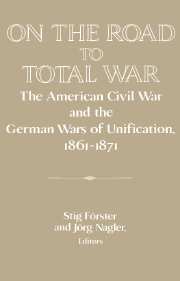Book contents
- Frontmatter
- 1 Introduction
- Part One Basic Questions
- Part Two Nationalism, Leadership, and War
- 4 Confederate Identity and the Will to Fight
- 5 Unionism and Abolition: Political Mobilization in the North
- 6 The Prussian Triangle of Leadership in the Face of a People's War: A Reassessment of the Conflict Between Bismarck and Moltke, 1870-71
- 7 Union Generalship, Political Leadership, and Total War Strategy
- Part Three Mobilization and Warfare
- Part Four The Home Front
- Part Five The Reality of War
- Part Six The Legacy
- Part Seven Conclusions
- Index
7 - Union Generalship, Political Leadership, and Total War Strategy
Published online by Cambridge University Press: 05 January 2013
- Frontmatter
- 1 Introduction
- Part One Basic Questions
- Part Two Nationalism, Leadership, and War
- 4 Confederate Identity and the Will to Fight
- 5 Unionism and Abolition: Political Mobilization in the North
- 6 The Prussian Triangle of Leadership in the Face of a People's War: A Reassessment of the Conflict Between Bismarck and Moltke, 1870-71
- 7 Union Generalship, Political Leadership, and Total War Strategy
- Part Three Mobilization and Warfare
- Part Four The Home Front
- Part Five The Reality of War
- Part Six The Legacy
- Part Seven Conclusions
- Index
Summary
The American Civil War introduced modern total war. For the first time, politicians and generals organized the total human and material resources of a mass industrial society for war and turned them to the total destruction of the resources, as well as the social and political system, of another society. For the first time, modern technology combined with modern ideology to realize Carl von Clausewitzs prognosis that the ideological currents of modern nationalism, carried on the backs of citizen armies, would intensify the totality of warfare.
This analysis assumes a definition of total war taken from Clausewitz and ultimately from the convergence of the ideas of Kant and Hegel in his thought. It assumes that pure total war is a logical abstraction, useful as a reference to pure logical limits along a plane from limited to total war. But we pursue military analysis within the real world of practical reason, where historically bound actors make decisions about changing technology, society, and culture, employing a practical balance of critical and intuitive levels of understanding. From this perspective, total war exists as a process of moving toward totality and away from the countervailing tendency toward limitation. This perspective rejects any definition of total war as a static mechanistic construct that requires all of its parts in place before the definition of totality is applied. Conceding the failure of any attempt to change the language usage from the mechanistic term total war, this analysis defines total war as this process of the balance shifting toward the totalizing of warfare.
- Type
- Chapter
- Information
- On the Road to Total WarThe American Civil War and the German Wars of Unification, 1861–1871, pp. 141 - 170Publisher: Cambridge University PressPrint publication year: 1997



